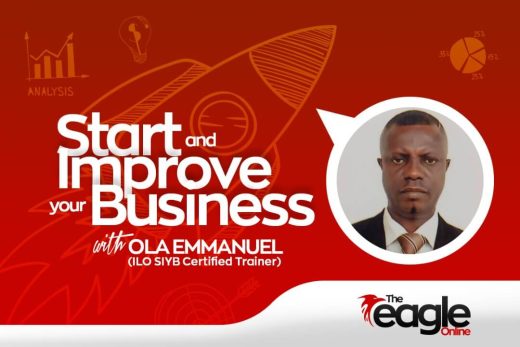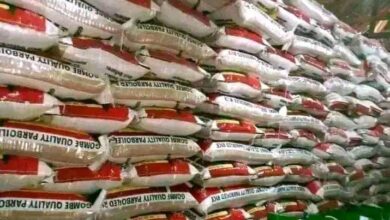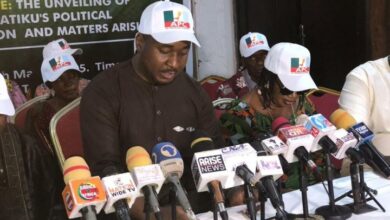Has our husband gone mad again? (Pt.1), |

by Ola Emmanuel
Credit to the literary icon, Ola Rotimi, for the title of his evergreen book, ‘Our Husband Has Gone Mad Again’. The humorous book is about the struggles in the home of a former military Major who decided to pursue a career in politics; and whose foreign wife, unaware of two other wives already in the house, decided to come live with him in Nigeria. The rancorous outbursts in the house of our retired Major also unveiled the quip, ‘one by each’. The episodic exchanges in the Ola Rotimi’s book is a perfect fitting for the ongoing Naira-for-crude confusions.
Should a government’s pursuits and policy direction run contrary to a people’s needs and wellbeing? ‘It must be a policy to support free peoples who are resisting attempted subjugation by armed minorities or by outside pressure’. This statement gave birth to what was later to be known as the Truman Doctrine. What followed the doctrine were two major initiatives: the Marshall Plan to rebuild the shattered economies of Western Europe after the Second World War in 1948, and the creation of NATO in 1949. What can be learnt from this, in short, is that we must not allow a few persons that possessed state powers (whether from outside or within) to make hapless masses suffer untold hardships – in their attempt to make themselves important, all-knowing and all-powerful in policy formulation. Currently in Nigeria and through the activities of MDAs, there are over 200 million people at the mercy of government’s actions and inactions.
During the Expert Group Meeting on Re-inventing Public Enterprise and their Management that held October 2005 in New York about a publication released titled ‘Public Enterprises: Unresolved Challenges and New Opportunities’ which was published by the United Nations in 2008, on the expert group meeting opined that though public enterprises in their usefulness work to address market deficits and capital shortfalls, promote economic development, reduce mass unemployment and ensure national control over the overall direction of the economy, the actions and inactions of these government institutions often fail to properly address market deficits and capital shortfalls, they hardly promote economic development, not to talk of reducing mass unemployment and/or ensuring control over the overall direction of the economy. And in addition to management deficits these public enterprises and their complicit agencies also suffered from technological shortcomings. In their rigidity and short-sightedness, they rate protocols higher than public good. They don’t care if the people they originally are to work for their well-being are suffering hardships. They are more concerned about preserving their self-interests which often make them become anti-people – so far they are enjoying themselves with their unhindered access to the resources of the people.


In rebuilding the collapsed economy of Nigeria, a major challenge is not only about gap between the dual currency exchange market, about best strategy to achieve the unification an permanently fix the foreign exchange market for the betterment of Nigeria’s economy, it is also about ensuring that the ever-mounting FX demands which far outweigh supplies is nipped, and that Nigerians reduce demands for the forex by reducing importation of finished products, and produce more goods locally for the export markets to boost FX supplies. This is no rocket science. It should be a patriotic posturing and policy direction that needs no hard explanation for every Nigerian and government agencies to key into. Therefore when the Naira-for-crude was introduced July 2024, even the unlettered Nigerians were happy that for once the government is ready to do something about the value of Naira by easing the pressures that have been causing lots of havoc to the costs of living and standards of living of Nigerians.
When the implementation of the naira for crude policy was approved eight months ago, Nigerians were told that President Tinubu had directed the Nigeria National Petroleum Corporation Limited, to ensure the Naira-for-crude is done with immediate effect. This much was said by the Special Adviser to the President on Revenue, Mr Zacch Adedeji. While briefing the press after the Federal Executive Council (FEC), Zacch Adedeji had said “the attitude of Mr President is thinking outside the box to solve Nigeria’s problem and actually to localise the solutions to Nigeria’s problem. He has approved through the Council that effective immediately, that NNPC get engaged with local refineries and we are starting that with Dangote Refinery. That the sales of crude oil to Dangote Refinery be denominated in Naria and also the sales of by-products from Dangote Refinery to distributors also be conducted in naira.”. It was not until October that this ‘effective immediately’ order, a strategic move to reduce pressures on foreign exchange (of which importation of PMS was placed at monthly spending of between 30% and 40% of foreign exchange, a whopping $660 million monthly) saw the light of day.
When the importance of this Naira-for-crude for domestic refinery is crystal clear, one wonders why what ought to be a policy-in-perpetuity has to be for an initial six months and nothing meaningful was done for its rollover until DR issued a press statement of its bid to suspend naira sale of PMS. In the first place, should sale of crude in local currency be a matter for debate if truly the people in government are truly committed to repairing the value of Nigeria’s currency and reshaping the economy? Should the Technical Sub-Committee of the Federal Ministry of Finance and Federal Ministry of Petroleum Resources on the Naira-for-Crude Policy wait till expiration (or near expiration) of the initial six months before reconvening to deliberate on the matter, knowing how cumbersome government protocol, bureaucracy and/or red tape is in Nigeria? There are many questions begging for answers that Nigerians need to raise.
to be continued
Ola Emmanuel is a business planning consultant
Post Views: 14






